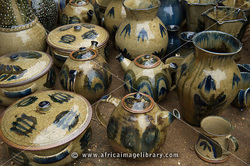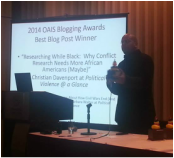
I had admired a honey pot in innocent’s house which she quickly gave to me as a gift (I learned later to watch what I admired openly as it would be taken as an opportunity to [a] graciously provide the guest with a nice present and [b] serve as an excuse to get some new stuff). When inquiring into where it was made, innocent smiled and said that we would stop there on the way back to Kigali.
On that trip, we took the usual rocky, roller-coaster from hell that is the Rwandan interstate. Traveling is always memorable. You bolt along at untold speeds - the speedometer’s broke, with untold amounts of gas - the gas gauge broke too but the driver’s spend so much time with the car that they just know when its time. Cars approach, you flash the lights to acknowledge them. Cars wish to pass (for the interstate is two-way), you wave them along when it is safe – i.e., when they can squeak in front of you with at least five inches before they hit the oncoming automobile.
While Death Race 2003 is taking place along the roadside you see people trying to get a ride (signaled by holding the right hand upward as if to say – “well”). There are cows being led by children with sticks. Elders follow behind. There are people hacking trees, selling tomatoes, selling clothes, baskets, gum, soda – everything. People carry gas cans filled with water. People carry buckets filled with metal, rocks and plastic. People carry each other on skooters, wheel barrels and bicycles. Then one passes a hill with several huts making the sharpest of turns seemingly at full speed. I am told that we are almost there. (I'm always told that we are almost there.)
Expecting to see some kind of storefront, I look out the window. All I see are rows of mud houses. We turn up a steep hill (the kind where you are sure that you will have to get out and push). Then the hill leveled off but the paved road went back to the highway, leaving us to our own devices. At this point, I saw something quite shocking.
I saw three handicapped people (two with missing legs crawling and one with a missing arm walking with the other two). They had just come out of an open area which contained hundreds more individuals with missing limbs. This site was shocking not because of who was there. I have obviously seen people with missing limbs. It was shocking because it occurred to me that I had not seen any handicapped people anywhere else. It was as if all had been brought to this spot. Just as quickly as I saw this, the truck rumbled off still further.
We then pulled up into a seemingly empty courtyard. Everyone got out and the driver went to a huge metal door – banging on it like in some old horror film. Some Kinyarwandan was spoken and the huge doors were opened.
As we walked in, we were immediately sized up by a group covered with black dust who were taking a break. Next to them were huge, unfinished pots. We passed small buildings no bigger than eight feet by eight feet, each containing something different – plates, mugs, sculptures – in between the building children and women began to observe us.
Upon a small clearing, we were led up to a series of buildings, the doors were open and our guide stepped back. It was like the King Solomon’s mine of pottery. They’re were pieces all over the place, in all corners of the room: mugs, statues, plates, bowls, pots for honey as well as stews, vases of all sizes and fishes – in room after room.
The prices were unreal; it was essentially free. Indeed, the only restriction on how many purchases that we were going to make was the weight of what your luggage would be or the security of the items from being crushed or stolen. Now, the former issue was problematic because each piece weighed a ton. The pottery was formidable with an interesting glaze placed over a wide variety of colors. The latter was problematic because it was clear looking behind the doors and in between the guards moving back and forth that the luggage going through the Rwandan system would not be treated delicately or with much concern for anything. If you put it through the system, the system was going to go through it. The key was to select something that the system didn’t really like. Alternatively, one could through an old timex in the bag to distract the baggage handler (these are a dime a dozen in the states but a Rwandan piece of pottery;.
As my associates wandered around, looking at different pieces, I looked at how the pieces were made. Huge open areas on top of fiery bricks were used to heat the pottery. You could feel the heat from 15 feet away. The pots cooled in the open air – steaming, unglazed, unfinished. At all points along the process, one saw the same faces – we toil for you mizungu being the message.
Stepping in between two buildings I realized that the village we saw earlier was only part of a larger structure. A series of houses moved along down a path coming from the hill top. One could see people moving up and down the walkway – children playing, children working, women carrying children, women working, occasionally a man would be seen – drinking (I never saw a woman drinking in Rwanda in eight years of traveling there).
The houses at the bottom of the hill were not nearly as nice as those which displayed the pottery. The whole scene reminded me of Mullet Bay in St. Martens – an old spot where my father used to take the family to fish, gamble and frolic (I was allowed the first and the third) as eviction notices awaited our return. Mullet Bay was an amazing resort – new buildings, immaculate beaches, pristine dining and excellent service. On the plantation, all was good.
One trip however (after leaving the Playboy club with my friend Adam), we ran across the cropier that had befriended us. He would throw a game our way now and then so we had some extra dollars for lap dances. Being kind, he invited us to his home for a drink. Upon reflection, the whole thing was a small form of rebellion to show us how things really were in his country.
As we walked, we saw the dramatic shift in just about everything: road quality, the disappearance of the color white and lights, the reversal of smiles that were seemingly plastered on everyone’s face to frowns (a natural response to what we saw around us), an increase in the number of people sitting outside, the size of houses, the volume of the music increased. I felt like the girl in Dirty Dancing who was shown the underside of the Catskill resort scene. What we saw in no way shape or form was comparable to where we stayed on the island. At the sight of his home, meeting his daughter (who couldn’t wait to work in the hotel) and wife (who already worked their as a waitress), all I could think about was burning down the hotel.
At the strong smell of a cow washed over me, I was brought back to Rwanda. It was not actually one cow but a small procession of several emaciated ones. They let the cows go through the middle of the pottery barn. I thought of the phrase regarding a bull in a glass shop but there seemed to be no problem as the cows seemed to know where they were going as well as how to get there. Here, there was a connection between the community and business unlike that seen on St. Martens. Both were built by outsiders but the distance (physically, socially and economically) was negligible. The two worlds were always a few yards away, traversed by voices, children and cows – repeatedly.

 RSS Feed
RSS Feed
